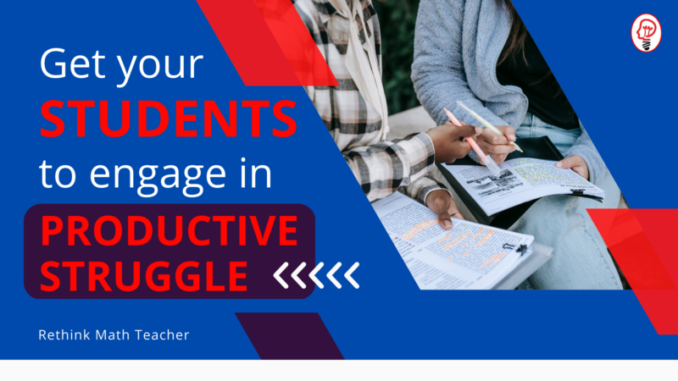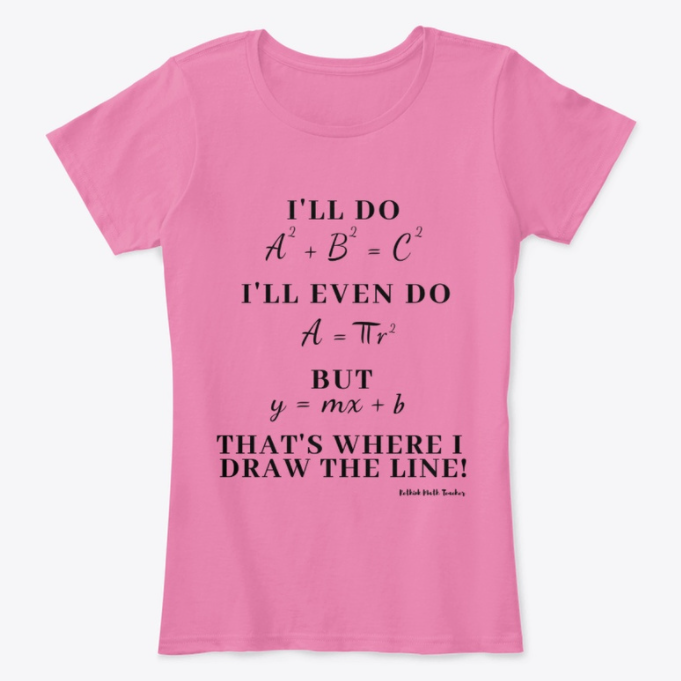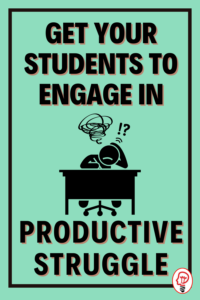
Productive struggle is a valuable skill and a powerful tool in the classroom. If your students will participate and engage in productive struggle, they will master the concepts being presented more quickly as well as more deeply. In short, they will truly understand what is being taught because they will have thought about it.
What is Productive Struggle?
Productive struggle is when students wrestle with the material when it’s challenging. If a student is faced with something they don’t fully understand, yet they try to solve it, they are productively struggling.
When a student makes an error and then evaluates his/her work to discover what they did wrong and how to correct it, this is productive struggle.

The opposite of productive struggle is often easier to spot because it’s so common in today’s classroom.
Not participating in productive struggle looks like this
- A student saying “I don’t get it” and not trying to move on
- A student not looking back at their notes to learn how to complete the process, instead waiting to be shown what the correct answer is
- A student staring out the window
- A student pretending to do the work
Why is Productive Struggle so Effective
When a student struggles, they are forced to think and evaluate the problem and the steps required to solve. Instead of robotically working through a process without understanding why, they are forced to consider what steps they should take to complete the work and why.
Thinking about these things helps the student understand the concepts. Not only knowing what steps to take, but why they should take it. This will help the student understand why the thing they are learning is the solution, how it works, and how to apply it to other, more challenging, problems.
This struggle will open the students mind to growth. When they are shown the right answer, or discover it on their own, they will be able to see why it is the correct answer. They will have mastery.

Why We Don’t Engage in Productive Struggle
Before you go calling your students lazy, or something worse, recognize that there are two very good reasons why students don’t participate in productive struggle.
Reason 1
The first reason students don’t participate in productive struggle is that it is not encouraged in schools. You might be thinking, “I tell my students all the time to try.” But that is not the message that our students receive from their teachers’ actions. Because what happens in most classrooms when a student makes an error? They are not rewarded for struggling. Instead, they are penalized. Sometimes with a bad grade, and sometimes with negative remarks.
Instead, we need to create an environment where wrong answers are not penalized, but the fact that the student made an attempt is celebrated. It’s hard to do this the way our current system is setup because, eventually, you have to give the students some form of measurement, to discover whether or not they have mastered the material. This invariably leads to points off their paper when they make a mistake.
What I like to do is give my students immediate feedback on their independent practice problems. So after teaching a skill, I will give some practice problems, and the answers are included. Students are encouraged to check their work after each problem. Then, if they got the wrong answer, go back and fix their work. Discover the mistake that led to the wrong answer, and correct it.
Another strategy I use is retake tests. If a student takes a test over a skill and they didn’t show mastery, I put them in a learning station on that skill where they are retaught the skill and practice it often (with immediate feedback) and then reassess them. I continue this pattern until the student masters the skill. Then, that good grade replaces the previous bad one(s).

Reason 2
The second reason students don’t participate in productive struggle is that it is against our nature. We are wired against it.
The human body actually burns a lot of calories when thinking. It is the most calorie burning activity we do! According to a report published in Scientific American, the human brain uses up to 20% of the body’s total energy consumption.
Research shows that chess players burn up to 130 calories per hour – meaning an 8 hour chess tournament (not uncommon) can result in burning over 1,000 calories! That’s the equivalence of playing an entire half of professional basketball with no rest – sprinting up and down the court, jumping, diving, etc. for 24 straight minutes!
Your body is designed to take mental shortcuts to conserve energy. I often give talks on this. When I do , I love to show this craft my wife purchased at a store whose name you would know.

The sign has a huge mistake. The word “with” is printed twice. But no one catches it. Not the person who made it, not the manufacturer that produced it, not the large name store that sold it, not my wife that bought it, and not the people I show it to.
Why don’t we catch this mistake? Because our brains are wired to take shortcuts. We do this to conserve energy – because thinking burns calories. And your body might need those calories later. What if barbarians attack the school later today? What if a meteorite strikes your home? The car doesn’t start? What if, what if, what if? Your body is designed to store calories for an emergency, and burning them needlessly over a silly sign or simple problem in your math class is counterproductive.
So we must help our students fight this natural hard wiring. A great way to do that is to incentivize thinking. You can do that by celebrating their success.
When you have an accomplishment your brain releases a chemical called dopamine. It causes that good feeling you get when you did something right! And it is a strong feeling. Your body will gladly burn calories to get that surge. It’s why we try so hard at some things. And it’s how you can get your students to productively struggle.
Have you ever seen a student when the lights turn on? When they finally get it? They feel great! They want to celebrate. They can’t help but shout out, “oh! It makes sense!”
Have you ever watched a student struggle for days on a concept, and get all their papers wrong, only to finally get an A on their quiz because you allowed them a retake test after remediating them? It’s amazing. It’s a feeling they will want over and over again.
How do We Get our Students to Struggle Productively?
I’ve given you several strategies in this post.
- Prepare them for the task at hand.
- Let them know that we are going to be doing something challenging, and the expectation is that they participate and try.
- Let them know that they are not allowed to raise their hand and ask for help, an explanation, or to say, “I don’t get it.” They are only allowed to try
- Don’t penalize failure. Instead, encourage it. It’s part of the learning process.
- Provide immediate feedback. How else will they know if they have struggled and persevered? They need to know right away!
- Remediate until mastery. If they didn’t grasp the concept, don’t move on to the next concept. Put them in a learning station and remediate them until they do.
- Celebrate their success. That dopamine hit will work wonders!
I accomplish all of this through learning stations. To learn more about learning stations, download my free cheat sheet.

Download for Free
